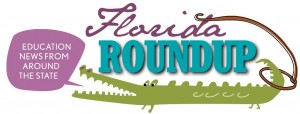 Schools of Hope: Thirty-three struggling Florida schools have applied for extra money through the state's Schools of Hope program. This is the second round of applications. In the first round, 50 schools applied for the extra $2,000 per student, but only 11 were accepted. The state is limiting the number of schools in the program to 25. The state Board of Education is expected to announce the winners next month. Gradebook.
Schools of Hope: Thirty-three struggling Florida schools have applied for extra money through the state's Schools of Hope program. This is the second round of applications. In the first round, 50 schools applied for the extra $2,000 per student, but only 11 were accepted. The state is limiting the number of schools in the program to 25. The state Board of Education is expected to announce the winners next month. Gradebook.
Proposed amendments: A committee of the Florida Constitution Revision Commission approves two proposed constitutional amendments - one that would set term limits for local school board members at eight consecutive years, retroactive to 2016, and another that would require school district superintendents to be appointed rather than elected. The proposals still have to be approved by 22 of the 37 commissioners before they can be placed on the November 2018 ballot. Then, 60 percent of voters would have to approve to put the amendments into effect. Gradebook. Politico Florida. The move to require school superintendents to be appointed riles some superintendents from rural areas. Politico Florida. The panel also will consider a proposal that would allow entities other than local school districts to oversee charter schools. The proposal was made by Erika Donalds, a Collier County School Board and CRC member. redefinED.
State responds to suits: Lawyers for the state are asking a a Leon County circuit court judge to dismiss a lawsuit against six provisions in the new education bill, H.B. 7069. They argued that the 13 districts bringing the suit don't have the standing to challenge five of those provisions. They also say claims that the law will harm local schools is "speculative." The sixth provision in the law requires districts to share more local tax revenues with charter schools. It is being challenged by the Palm Beach County School Board. State lawyers point out that districts are already required to share some local tax money with charters. redefinED.
 Governor's education budget: Gov. Rick Scott's $87.4 billion budget proposal includes a request to increase per student spending by $200, to $7,497, boost the state's voluntary pre-kindergarten program by $12 million, add $23 million for Bright Futures scholarships, and give $18 million to help teachers buy classroom supplies. Scott would pay for the increases by keeping property tax rates the same and allowing increasing property values to drive up revenue. The proposal now goes to the Legislature for consideration. News Service of Florida. Gradebook. Associated Press. Florida Politics. Orlando Sentinel. Politico Florida. Florida Times-Union.
Governor's education budget: Gov. Rick Scott's $87.4 billion budget proposal includes a request to increase per student spending by $200, to $7,497, boost the state's voluntary pre-kindergarten program by $12 million, add $23 million for Bright Futures scholarships, and give $18 million to help teachers buy classroom supplies. Scott would pay for the increases by keeping property tax rates the same and allowing increasing property values to drive up revenue. The proposal now goes to the Legislature for consideration. News Service of Florida. Gradebook. Associated Press. Florida Politics. Orlando Sentinel. Politico Florida. Florida Times-Union.
H.B. 7069 challenge: Nine Florida schools boards contend that the new education law, H.B. 7069, violates the law by dealing with more than one subject, and are asking the state Supreme Court to void it. Two other lawsuits have been filed against the law by school districts, but this one focuses solely on the single-subject issue and is asking for immediate action. “Waiting for a trial-court determination and its subsequent appellate review will allow irreversible damage to the function of the public education system to occur throughout the state of Florida,” the lawsuit states. The nine school boards are from Alachua, Bay, Broward, Hamilton, Lee, Polk, St. Lucie, Volusia and Wakulla counties. News Service of Florida. Politico Florida. The Collier County School Board votes to join at least 13 other districts in suing the state over the education bill because it requires public school districts to share property tax revenues with charter schools. Naples Daily News.
ESSA plans: Florida's accountability plan for complying with the Every Student Succeeds Act is weak in the category of encouraging schools to focus on all students, not just low performers, according to an evaluation by the Thomas B. Fordham Institute, a conservative think tank. Florida was one of 13 states considered weak in this area. The state was given an evaluation of strong in the other two areas weighed: in the clarity of the ratings to parents, educators and the public, and in the fairness of the rating system for all schools, including ones with high levels of poverty. The 74.